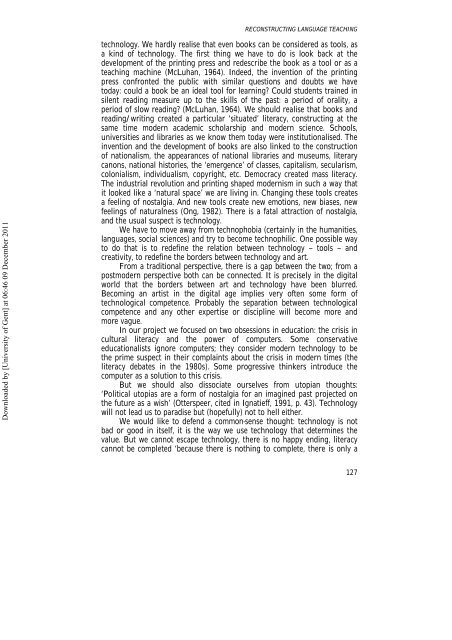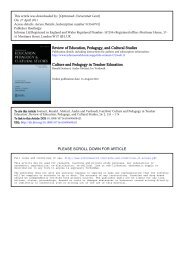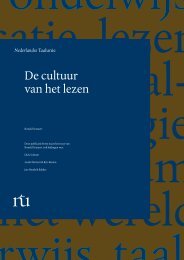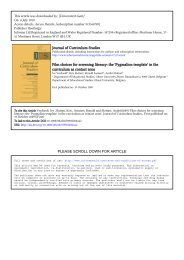a view informed by the problems of traditional literacy in a digital age
a view informed by the problems of traditional literacy in a digital age
a view informed by the problems of traditional literacy in a digital age
Create successful ePaper yourself
Turn your PDF publications into a flip-book with our unique Google optimized e-Paper software.
Downloaded <strong>by</strong> [University <strong>of</strong> Gent] at 06:46 09 December 2011<br />
RECONSTRUCTING LANGUAGE TEACHING<br />
technology. We hardly realise that even books can be considered as tools, as<br />
a k<strong>in</strong>d <strong>of</strong> technology. The first th<strong>in</strong>g we have to do is look back at <strong>the</strong><br />
development <strong>of</strong> <strong>the</strong> pr<strong>in</strong>t<strong>in</strong>g press and redescribe <strong>the</strong> book as a tool or as a<br />
teach<strong>in</strong>g mach<strong>in</strong>e (McLuhan, 1964). Indeed, <strong>the</strong> <strong>in</strong>vention <strong>of</strong> <strong>the</strong> pr<strong>in</strong>t<strong>in</strong>g<br />
press confronted <strong>the</strong> public with similar questions and doubts we have<br />
today: could a book be an ideal tool for learn<strong>in</strong>g? Could students tra<strong>in</strong>ed <strong>in</strong><br />
silent read<strong>in</strong>g measure up to <strong>the</strong> skills <strong>of</strong> <strong>the</strong> past: a period <strong>of</strong> orality, a<br />
period <strong>of</strong> slow read<strong>in</strong>g? (McLuhan, 1964). We should realise that books and<br />
read<strong>in</strong>g/writ<strong>in</strong>g created a particular ‘situated’ <strong>literacy</strong>, construct<strong>in</strong>g at <strong>the</strong><br />
same time modern academic scholarship and modern science. Schools,<br />
universities and libraries as we know <strong>the</strong>m today were <strong>in</strong>stitutionalised. The<br />
<strong>in</strong>vention and <strong>the</strong> development <strong>of</strong> books are also l<strong>in</strong>ked to <strong>the</strong> construction<br />
<strong>of</strong> nationalism, <strong>the</strong> appearances <strong>of</strong> national libraries and museums, literary<br />
canons, national histories, <strong>the</strong> ‘emergence’ <strong>of</strong> classes, capitalism, secularism,<br />
colonialism, <strong>in</strong>dividualism, copyright, etc. Democracy created mass <strong>literacy</strong>.<br />
The <strong>in</strong>dustrial revolution and pr<strong>in</strong>t<strong>in</strong>g shaped modernism <strong>in</strong> such a way that<br />
it looked like a ‘natural space’ we are liv<strong>in</strong>g <strong>in</strong>. Chang<strong>in</strong>g <strong>the</strong>se tools creates<br />
a feel<strong>in</strong>g <strong>of</strong> nostalgia. And new tools create new emotions, new biases, new<br />
feel<strong>in</strong>gs <strong>of</strong> naturalness (Ong, 1982). There is a fatal attraction <strong>of</strong> nostalgia,<br />
and <strong>the</strong> usual suspect is technology.<br />
We have to move away from technophobia (certa<strong>in</strong>ly <strong>in</strong> <strong>the</strong> humanities,<br />
langu<strong>age</strong>s, social sciences) and try to become technophilic. One possible way<br />
to do that is to redef<strong>in</strong>e <strong>the</strong> relation between technology – tools – and<br />
creativity, to redef<strong>in</strong>e <strong>the</strong> borders between technology and art.<br />
From a <strong>traditional</strong> perspective, <strong>the</strong>re is a gap between <strong>the</strong> two; from a<br />
postmodern perspective both can be connected. It is precisely <strong>in</strong> <strong>the</strong> <strong>digital</strong><br />
world that <strong>the</strong> borders between art and technology have been blurred.<br />
Becom<strong>in</strong>g an artist <strong>in</strong> <strong>the</strong> <strong>digital</strong> <strong>age</strong> implies very <strong>of</strong>ten some form <strong>of</strong><br />
technological competence. Probably <strong>the</strong> separation between technological<br />
competence and any o<strong>the</strong>r expertise or discipl<strong>in</strong>e will become more and<br />
more vague.<br />
In our project we focused on two obsessions <strong>in</strong> education: <strong>the</strong> crisis <strong>in</strong><br />
cultural <strong>literacy</strong> and <strong>the</strong> power <strong>of</strong> computers. Some conservative<br />
educationalists ignore computers; <strong>the</strong>y consider modern technology to be<br />
<strong>the</strong> prime suspect <strong>in</strong> <strong>the</strong>ir compla<strong>in</strong>ts about <strong>the</strong> crisis <strong>in</strong> modern times (<strong>the</strong><br />
<strong>literacy</strong> debates <strong>in</strong> <strong>the</strong> 1980s). Some progressive th<strong>in</strong>kers <strong>in</strong>troduce <strong>the</strong><br />
computer as a solution to this crisis.<br />
But we should also dissociate ourselves from utopian thoughts:<br />
‘Political utopias are a form <strong>of</strong> nostalgia for an imag<strong>in</strong>ed past projected on<br />
<strong>the</strong> future as a wish’ (Otterspeer, cited <strong>in</strong> Ignatieff, 1991, p. 43). Technology<br />
will not lead us to paradise but (hopefully) not to hell ei<strong>the</strong>r.<br />
We would like to defend a common-sense thought: technology is not<br />
bad or good <strong>in</strong> itself, it is <strong>the</strong> way we use technology that determ<strong>in</strong>es <strong>the</strong><br />
value. But we cannot escape technology, <strong>the</strong>re is no happy end<strong>in</strong>g, <strong>literacy</strong><br />
cannot be completed ‘because <strong>the</strong>re is noth<strong>in</strong>g to complete, <strong>the</strong>re is only a<br />
127





